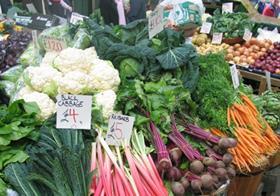
In the UK, the Fresh Produce Consortium (FPC) has confirmed that it feels the industry is well placed to play an important role in the 'greening' of the economy, to help meet the challenges of global food security and contribute towards sustainable development.
The FPC made the statement in the wake of a new report from the United Nations Environment Programme, entitled 'Towards a Green Economy: Pathways to Sustainable Development and Poverty Eradication', which demonstrated that with just a two per cent investment of global GDP, a 'green' economy can deliver wealth creation and employment opportunities in developed and developing countries.
'We welcome this report which debunks many myths and recognises the ethical dimension of trade in fresh produce between developing countries and the UK,' said Nigel Jenney, chief executive of FPC. 'The fresh produce industry is meeting the challenges of sustainable development by introducing integrated crop management techniques, reducing waste and inefficiency throughout the supply chain.'
According to the group, FPC has worked to highlight the complexities of the food supply chain and its social, political and economic repercussions, and to capture the true impact of food production and consumption.
'The UK is more than 74 per cent self-sufficient in agricultural produce yet we cannot produce all our fruit and vegetables in the UK,' the FPC noted. 'Around 60 per cent of fruit and vegetables are imported into the UK, mostly from within the EU, providing us with produce outside the UK season as well as varieties which simply cannot be grown in the UK.'
Research has shown that some imported produce is grown in less greenhouse gas intensive ways than the same products in the UK, with savings from greater efficiency outweighing the potential negative impacts of additional transport.
Indeed, the consumption of fruit and vegetables accounts for only 2.5 per cent of the UK's greenhouse gas emissions in total, the FPC said.
'Ill-founded concerns about the impact of transportation of fresh produce from developing countries must be put in perspective, and balanced against the need to achieve a healthy diet, as well as assisting the development of local economies in Africa,' Mr Jenney added. 'To encourage the UK consumer to eat 5-a-day we need a wide variety of fresh produce regardless of origin or means of transport.'
FPC pointed to the importance of agricultural growth to overall economic growth in Africa, with imports from Kenya to the UK alone worth £100m (€114m), and said that there was 'no evidence' that fewer aircraft would fly if less imported fruit and vegetables were eaten.



